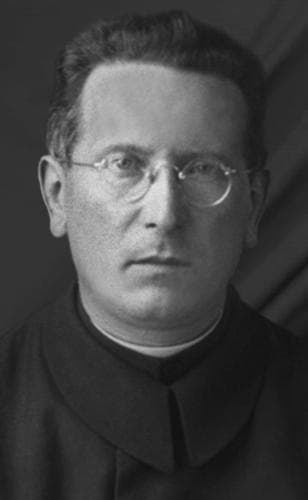
Blessed Giovanni Fausti
Blessed
Feast Day: March 4
Birth: October 19, 1899
Death: March 1, 4
Biography
Blessed Giovanni Fausti, also known as Gjon Fausti, was born on 19 October 1899 in Brozzo, Marcheno, Val Trompia, Brescia, Italy. He was the eldest of twelve brothers in his family. At a young age, he exhibited exceptional intellectual abilities and a strong devotion to his faith.
After completing his early education, Giovanni pursued his priestly formation at the Inter-Brescia seminary. It was during this time that he befriended the future Pope Paul VI, with whom he maintained a close friendship throughout his life. Recognizing his academic talent, Giovanni was sent to the prestigious Pontifical Gregorian University in Rome, Italy, where he graduated in 1922.
On 9 July 1922, Giovanni Fausti was ordained as a priest. Following his ordination, he joined the faculty of the Inter-Brescia seminary, teaching philosophy in 1923. However, his calling extended beyond the seminary walls, and in 1924 he entered the Society of Jesus (Jesuits) in Gorizia, Italy.
In 1929, Father Giovanni Fausti assumed the position of chair of the philosophy department in Scutari, Albania. He dedicated himself to the academic and spiritual formation of his students. Three years later, he became the leader of the Jesuit community in Mantua, Italy, while continuing his role as the head of the philosophy department.
Father Gjon had always been passionate about knowledge and education, but his health started to deteriorate in 1932 due to lengthy health problems. As a result, he had to reduce his work schedule and seek regular treatment. However, his dedication and commitment to his vocation remained unwavering. After making his solemn profession in the Jesuits on 2 February 1936, he resumed full-time administration, teaching, and ministry.
In July 1942, Father Giovanni Fausti was appointed as the rector of the Pontifical Seminary of Scutari, along with its adjoining Xaverian college. During his time in this position, he actively worked towards promoting interreligious dialogue, particularly between Christians and Muslims, in Albania.
With the outbreak of World War II and the subsequent privations and persecutions, Father Gjon transferred to Tirana, Albania, in 1943. In the midst of the chaos, he dedicated himself to assisting and protecting all Albanians, regardless of their religious affiliations. His compassion and selflessness were instrumental in providing solace and support to the suffering people.
In recognition of his exceptional qualities, Father Giovanni Fausti was appointed as the vice-provincial of the Jesuits in Albania in 1945. However, his tireless efforts and unwavering commitment to his faith made him a target of the Communist regime. On 31 December 1945, he was arrested and charged with being a spy for the Vatican and a traitor to Albania.
In a show trial, Father Giovanni Fausti was sentenced to death. On 4 March 1946, at 6 am, he was executed by a machine-gun squad at the Varrezat e Rrmajit cemetery in Shkodrô, Albania. The authorities left his body outside for a day as a grim warning to the local population about the consequences of opposing the Communists.
On the night of 5 March, Father Gjon and other martyrs were buried in a mass grave near a nearby river bed. To conceal the grave, rubbish bins were stacked on top. This final resting place, hidden from view, served as a poignant reminder of the sacrifices made by those who stood up for their faith.
The immense faith, courage, and sacrifice exhibited by Father Giovanni Fausti resonated deeply with the Catholic community and beyond. His martyrdom was recognized by Pope Francis on 26 April 2016 when he was declared venerable, and later on 5 November 2016, Pope Francis bestowed the honor of beatification upon him. The beatification ceremony took place at the Square of the Cathedral of Shôn Shtjefnit in Shkodôr, Albania, presided over by Cardinal Angelo Amato.
Blessed Giovanni Fausti's life continues to inspire the faithful, serving as a powerful testimony to the values of faith, intellect, and selflessness. His dedication to fostering interreligious dialogue and his unwavering commitment to justice and compassion embody the principles of the Catholic faith.